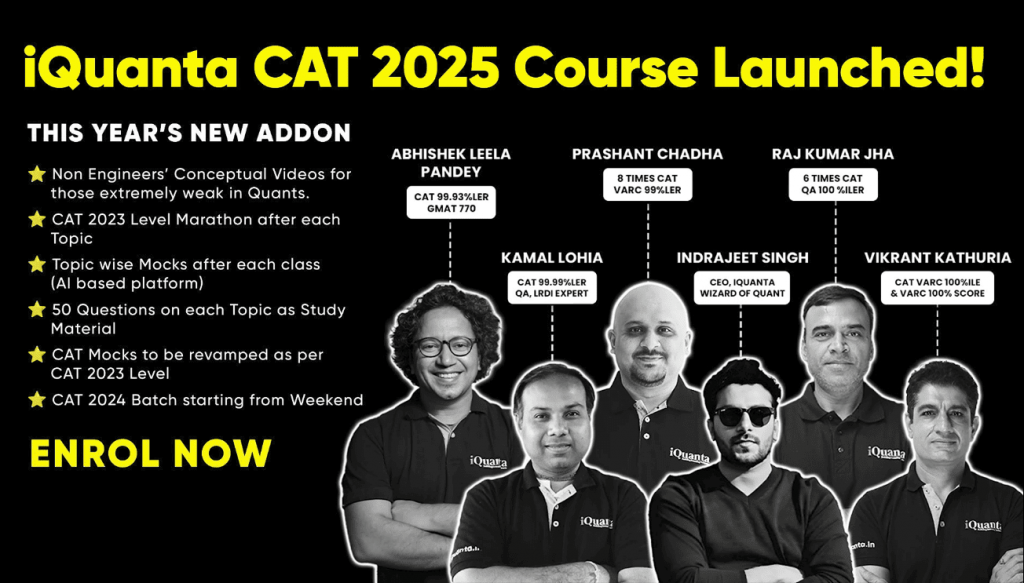CAT is the most challenging entrance exam when it comes to pursuing MBA from India. It takes good amount of time for it to prepare, and also consistent efforts are needed to ace the exam. The preparation strategy also varies vastly between different groups of aspirants and are often advised to tweak their strategies accordingly. While it is true that preparing for CAT alongside juggling your job is a hectic task, but non-working individuals should also not take this preparation journey lightly. Additionally, the non-working crowd can either be students who are pursuing their UG degrees or someone on a break, hence still managing time smartly becomes very important. This article will focus on CAT preparation strategy for non-working individuals and how they can efficiently allocate their time in the next 1 year.
CAT Preparation Full course by iQuanta
Understanding the CAT Exam 2025
Before directly diving into the preparation, it is very important to understand the CAT exam pattern. CAT is known for its complex questions (usually questions having a mix of 2 or 3 concepts) within a strict time bound, testing your aptitude across three sections:
- Verbal Ability and Reading Comprehension (VARC): This section will assess your command over English language, grammar and reading skills.
- Data Interpretation and Logical Reasoning (DILR): It is basically there to test your logical reasoning and data interpretation skills.
- Quantitative Ability (QA): This section will gauge your mathematical skills and understanding of other numerical concepts.
Each section requires will require a unique preparation approach. It is important to familiarize yourself with the entire syllabus, exam pattern, all of these within the given sectional time limit i.e., 40 minutes per section.
Step 1: Create a Personalized Study Schedule for CAT 2025
One of the most significant advantages of being a non-working aspirant is that you can create your study plan without the constraints of a job which is mostly non-accommodating in nature. However, having more time compared to others does not mean you should study without a proper plan. Hence, create a timetable that fits well in your daily routine, balancing study hours, any other commitments, revision, and also adequate time to relax.
- Morning: If you are a morning person, dedicate early hours to concepts that require high focus or something which you termed as a weakness. Example could be to cover quantitative aptitude in those hours.
- Afternoon: You can use this time for solving a DILR set or maybe attempting a reading comprehension passage.
- Evening: You can either use this time for a mock test or a sectional test to improve your sectional strength.
Make sure you allocate time judiciously such that you accommodate short breaks between study sessions. This will help you keep refreshed and maintain your concentration throughout the day.
Step 2: Master the Basics First for CAT 2025
Many CAT aspirants make the mistake of jumping directly to advanced-level questions without covering the basics. You should ideally start your preparation by nicely understanding the basics of each section.
- For QA: Cover the mostly repeated topics such as arithmetic, algebra, geometry and number systems. Refer to multiple online resources for better preparation.
- For VARC: Start by building the habit of reading newspapers and non-fiction novels to improve your overall comprehension and basic vocabulary. Additionally focus on grammar rules to improve your VA accuracy.
- For DILR: Start with basic puzzles and multiple charts to develop both logical thinking and data interpretation skills.
Mastering the fundamentals will set a strong foundation for handling complex problems later.
Step 3: Utilize Quality Study Materials for CAT 2025
Internet is flooded with material and not everything can be used in your favour. Therefore, having access to the right resources can make a significant difference in your overall preparation. Some of the commonly used and recommended options as per CAT preparation strategy for non-working individuals include:
Books:
- iQuanta Books
- Quantitative Aptitude by Arun Sharma
- How to Prepare for Verbal Ability and Reading Comprehension for CAT by Meenakshi Upadhyay
- Logical Reasoning and Data Interpretation for CAT by Nishit Sinha. Logical Reasoning and Data Interpretation for CAT by Arun Sharma
- Online Platforms: A lot of websites and apps offer free and paid CAT preparation content. Enrol in courses that suits the best with your learning style and also the timings.
Remember to stick to a handful of reliable sources instead of overwhelming yourself with too many materials.
Step 4: Solve CAT Mock Tests Regularly
Mock tests are an integral and non-negotiable part of CAT preparation. As a non-working individual, you can devote good amount of time to analyze and learn from every mock test. Start by attempting topic-wise or sectional mocks before moving to full-length tests.
- Set a Goal: Aim to attempt at least 30 full-length mocks before the actual CAT exam
- Analyze Performance: Spend time to understand your strengths and weaknesses
- Track Progress: Maintain a notebook to write down areas of improvement, new strategies and important formulas for you to revise later.
Mock tests not only improve accuracy and speed but also help in managing exam stress in general.
Step 5: Focus on Time Management and Speed for CAT 2025
The CAT exam is about both speed as well as accuracy. You have to learn to prioritize questions by identifying which ones to attempt first, which all to attempt in the next round and which one to leave.
- QA: Learn to use mental math to reduce time spent on calculations unnecessarily.
- VARC: Develop skimming techniques to understand the tone of the reading comprehension passages quickly rather than wasting time on it.
- DILR: Check and see if you are familiar with any set solved earlier. Attempt the usually attempted sets which are sitters.
Step 6: Stay Motivated and Avoid Burnout
One challenge that non-working aspirants face is staying motivated throughout the preparation journey. Usually, people having a break year tend to lose focus and motivation. The absence of a good schedule can further lead to procrastination or burnouts. Here are a few tips as per our CAT preparation strategy for non-working individuals on how to stay on track:
- Set Realistic Goals: Break your total preparation into weekly or monthly targets. Enjoy smaller wins to keep yourself motivated throughout the journey.
- Join a Study Group: Connect with other CAT aspirants or certain learning communities to ideate strategies and discuss doubts.
- Take Breaks: Do not be harsh on yourself. Take sufficient time out of the usual routine to pursue some hobby or just enjoy doing any leisure activity.
Always remember that consistency is more important than the number of hours you study. Focus on quality over quantity.
Step 7: Revise Regularly for CAT 2025
Revision is the key to remember concepts and improve accuracy. Do not wait for the end to revise. Keep revising always once a topic is covered.
- Create Summary Notes: Write down formulas, shortcuts and key takeaways from each topic which you cover.
- Solve Previous Year Papers: Solving these will give you an idea of question patterns and also the difficulty levels.
- Review Mistakes: Analyze mistakes made during mock tests and ensure you do not repeat them by strategizing well.
Ample revision will enhance your confidence and performance.
Step 8: Take Care of Your Health
Good physical and mental health are very important for a well-rounded preparation. Given that you have lesser commitments vis-à-vis a working aspirant, ensure to follow a holistic routine.
- Exercise Regularly: Indulge in any physical activity or take a walk. It boosts concentration and reduces stress.
- Eat Well: A balanced diet will keep your energy levels high during study sessions. Additionally helps you keep healthy and immune.
- Sleep Adequately: Ensure you get 7–8 hours of sleep to stay productive throughout the daytime.
Common Mistakes to Avoid for CAT Preparation 2025
Even with ample free time, a set of non-working aspirants can fall into some common traps which might hamper their preparation negatively. Avoid these mistakes to stay ahead in your preparation by following the below steps:
- Overloading Yourself: Do not try to cover everything in a short span of time. Focus on quality over quantity and give more time your weaknesses but ensure you do it all.
- Ignoring Weak Areas in CAT: Spend extra time improving sections where you struggle. You can also join certain coaching if you are lacking motivation sitting at home.
- Skipping Mock Analysis: A test is only beneficial if you learn from it. Just giving the mock is a half-baked proposition which yields no good. Analyse them well.
- Neglecting overall Well-being: Preparation is definitely stressful. Take breaks, meet your friends, eat out and enjoy the overall preparation journey.
So if you are targeting a 99+%ile in CAT 2025, iQuanta has got you covered. Get highly relevant content along and prepare right from the very basics with iQuanta’s CAT 2025 Course.


